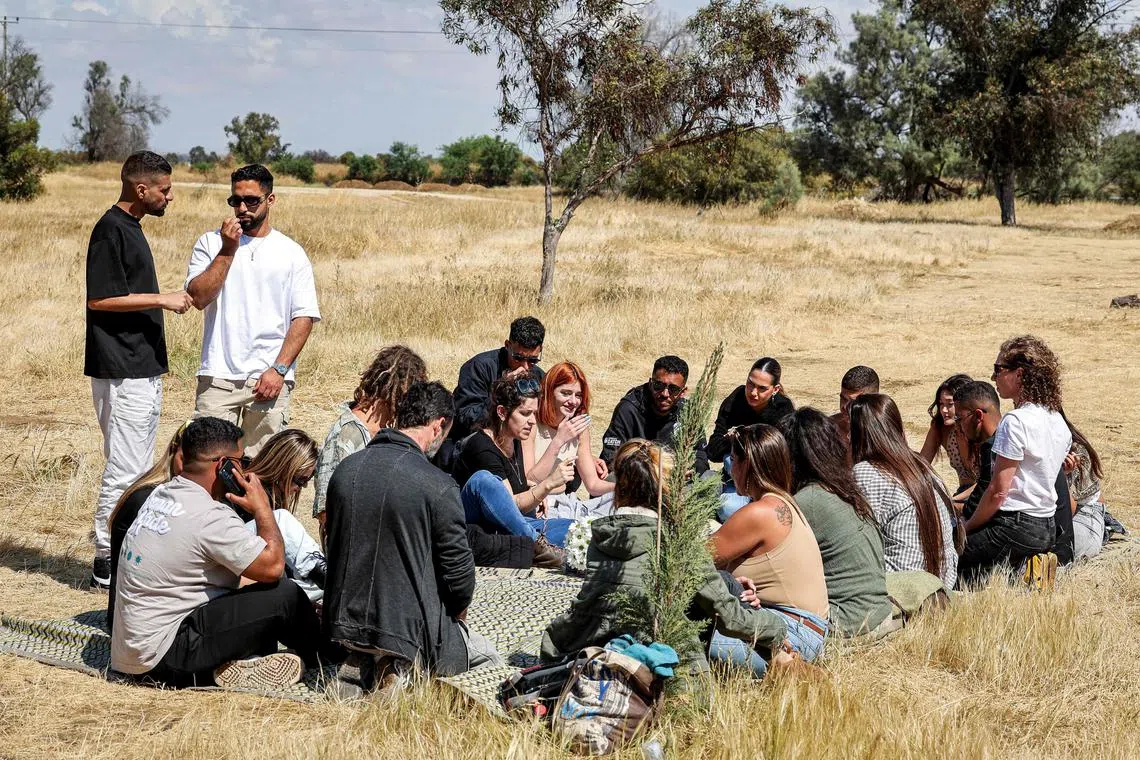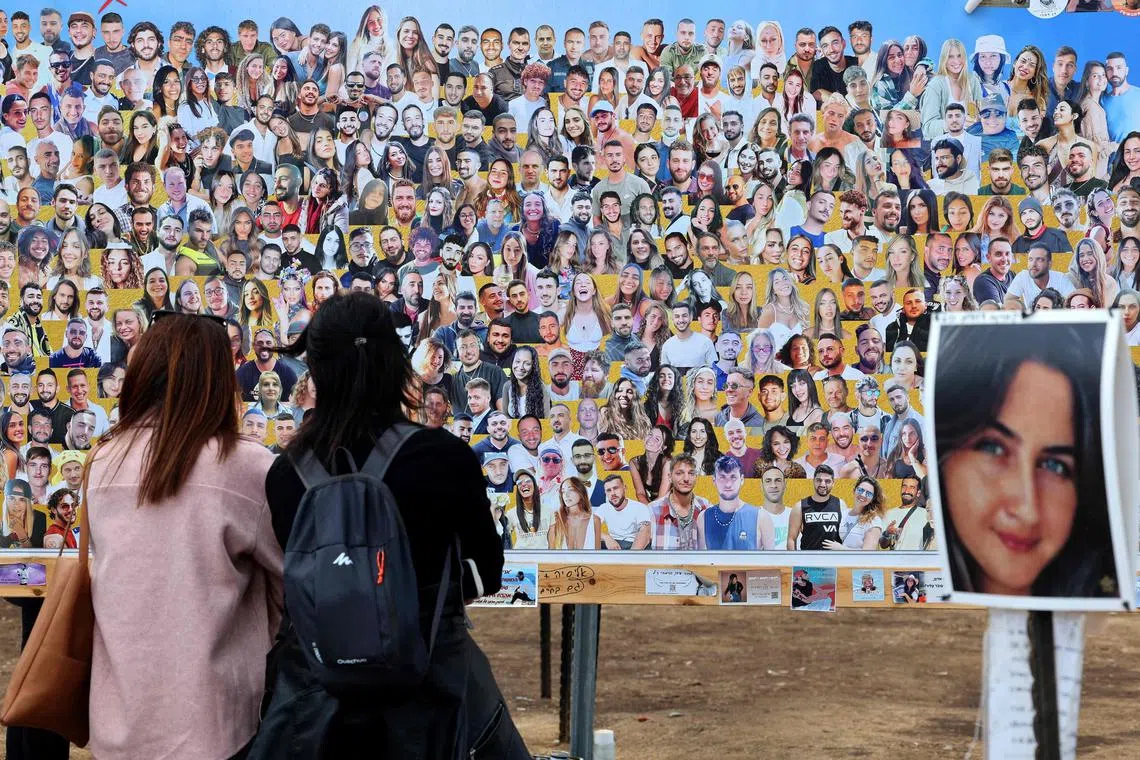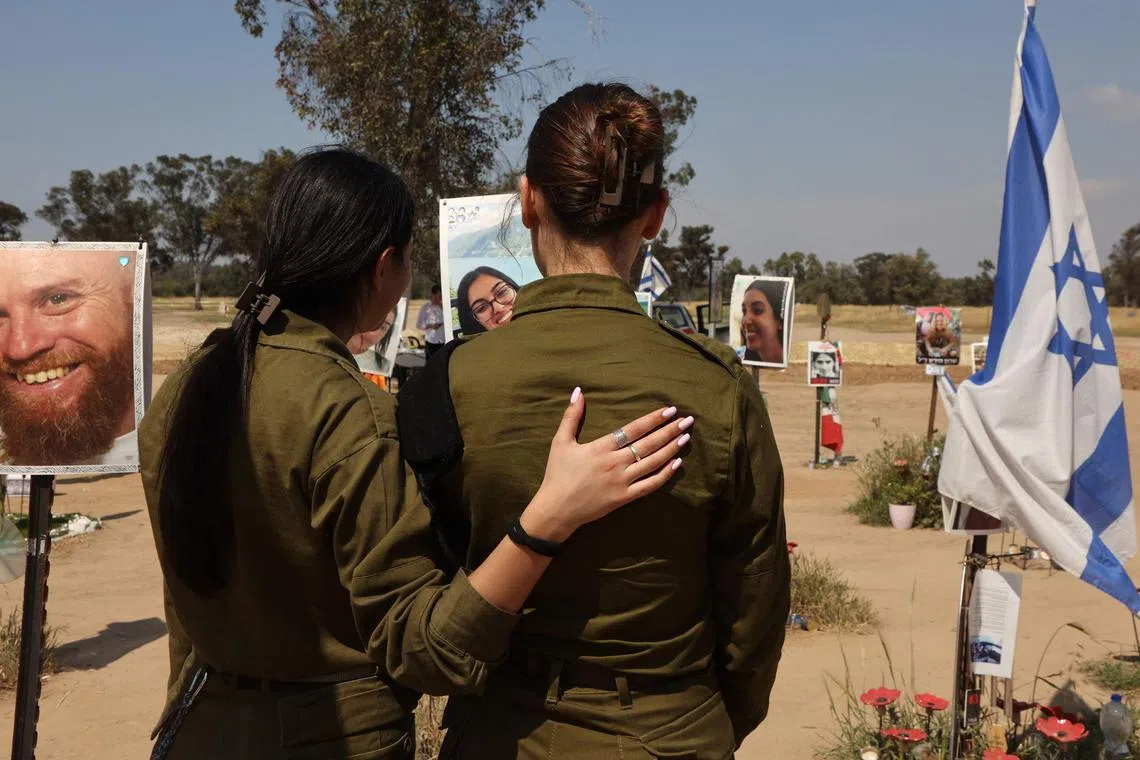Survivors return to site of Israel festival mass killing
Sign up now: Get ST's newsletters delivered to your inbox

Survivors of the Oct 7, 2023, attack on the Supernova music festival gather after returning to the site near Kibbutz Re'im in southern Israel on April 10.
PHOTO: AFP
RE’IM (Israel) – Neria Goelman and Hannah Zedek, who both escaped the bloody Hamas attack on the Nova music festival in southern Israel six months ago, found the bush they were searching for.
“It was in this bush that we hid for four hours,” Goelman said, standing in front of the shrub.
“Then it caught fire because the terrorists fired grenade launchers and we had to flee,” added the 21-year-old, who along with Zedek, 20, had been security guards at the festival.
Thousands of young people had gathered on Oct 6 and 7 to dance to electronic music at the festival, which was held near the Re’im kibbutz close to the Gaza border.
Fighters from Palestinian militant group Hamas crossed over and killed 364 people at the festival.
The victims accounted for nearly a third of the 1,170 people killed in the Oct 7 attack
Israel launched a retaliatory offensive against Hamas that has killed at least 33,729 people in Gaza, mostly women and children, according to the Hamas-run territory’s health ministry.
Goelman and Zedek returned to Re’im on April 10 along with about 10 other survivors for a trip organised by a group called A Future for the Survivors and the Wounded.
Accompanied by AFP, the pair retraced the route they took as they fled the clearing where the festival was held.
After a 10-minute walk through the forest, they crossed a concrete road and found their hideout.
“I want to say thank you,” Zedek said as she scrambled through the bush’s branches.
Afraid to come back
Out of the 250 people taken hostage during the Hamas attack, more than 40 had been at the festival. An estimated 129 hostages remain in Gaza, including 34 the Israeli army says are dead.
In Re’im, the clearing that had once been the festival’s dance floor is now an open-air memorial, dotted with pictures of all the young people who were slain or kidnapped.
Relatives of the victims and other supporters come to the site to pay their respects, some leaving flowers.
It was the first time Mor Zalah had returned to the site since the attack.

Israelis visit a memorial bearing portraits of people taken hostage or killed at the site of the festival near Kibbutz Reim in southern Israel on April 10.
PHOTO: AFP
“I have been wanting to come for a long time, I just felt this was the right moment,” the 27-year-old said.
On Oct 7, Zalah and her 19-year-old sister Carmel had walked for many hours before they were rescued.
But they lost track of Zalah’s boyfriend Idan.
When Zalah saw a photo of Idan at the spot where he was killed six months ago, she fell to the ground and burst into tears.
Sitting on a chair slightly away from the group, Guy Shema looked over the scene in silence.
“I was bit afraid to come back,” the 23-year-old told AFP. “I didn’t know what to expect.”
Shema said she wanted to “retrace what happened to fill in the missing parts” in her memory.
She is startled by the sound of Israeli bombardments a few kilometres (miles) away in Gaza.
After the attack, Shema was diagnosed with post-traumatic stress disorder.
At the Nova site, three therapists accompanied the group to offer psychological support.

Israeli soldiers visit a memorial bearing portraits at the site of the festival near the kibbutz Re’im in southern Israel on April 7.
PHOTO: AFP
Seems like it was yesterday
Many of the survivors are still in distress, said Neria and Daniel Sharabi, who are 22 and 23 years old, respectively.
The brothers are considered heroes in Israel. They are credited with saving dozens of festival-goers by using weapons they found in a tank to fend off Hamas fighters.
Their best friend Yossef Haim Ohana, 23, is believed to still be a hostage of Hamas.
“Our motto is ‘no one left behind’,” said Neria Sharabi at the spot where the tank once stood.
His brother Daniel said that “getting back to a normal life is very difficult”.
“Most survivors struggle to get back on their feet.”
Shema said: “It helps me to be with people who face the same problems.”
She has changed jobs four times in the past six months. “I can’t manage the stress,” she said.
“It still seems like it was yesterday.” AFP


